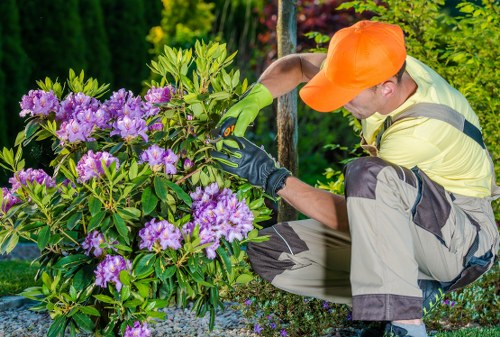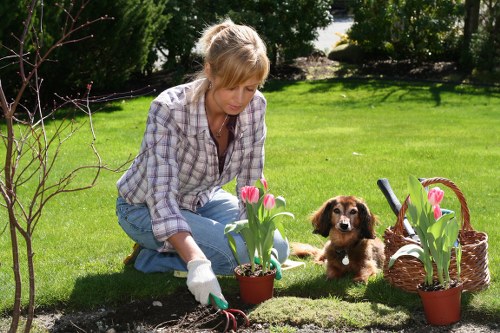Lawn Mowing Crossness: Your Comprehensive Guide to a Beautiful Lawn

Maintaining a beautiful lawn in Crossness requires understanding the local environment and applying the right lawn mowing techniques. Whether you're a homeowner, a gardener, or someone responsible for public green spaces, this guide will help you achieve a lush, green lawn that stands out in the community.
Crossness, located in the southeastern part of London, enjoys a temperate climate ideal for various types of grass. However, factors like soil quality, rainfall, and sunlight exposure can affect lawn health. Proper lawn mowing is essential for promoting grass growth, preventing weeds, and maintaining an aesthetically pleasing yard.
In this guide, we'll cover everything you need to know about lawn mowing in Crossness, including the best mowing practices, equipment recommendations, seasonal care tips, and information about the surrounding areas that might influence your lawn maintenance strategies.
Understanding Lawn Mowing Basics

Lawn mowing is more than just cutting grass; it plays a crucial role in lawn health. Regular mowing helps to:
- Promote Healthy Growth: Cutting the grass encourages the plant to grow thicker and stronger.
- Control Weeds: Regular mowing can prevent weeds from taking over your lawn.
- Enhance Curb Appeal: A well-mowed lawn significantly enhances the overall appearance of your property.
To achieve these benefits, it's important to follow best practices tailored to the specific conditions in Crossness. This includes choosing the right mowing height, frequency, and techniques.
Choosing the Right Mowing Height: Different grass types thrive at different heights. Generally, keeping your lawn at a height of 2.5 to 3.5 inches is ideal for most cool-season grasses common in Crossness.
Best Practices for Lawn Mowing

Adhering to best mowing practices can make a significant difference in the health and appearance of your lawn:
- Regular Mowing: Mow your lawn regularly, aiming to cut no more than one-third of the grass blade length in a single mowing session.
- Sharp Blades: Ensure your mower blades are sharp to make clean cuts and reduce the risk of disease.
- Mowing Pattern: Vary your mowing pattern each time you mow to prevent the grass from leaning in one direction and to encourage upright growth.
- Avoid Mowing Wet Grass: Mowing wet grass can lead to uneven cutting and increase the risk of disease spreading.
Implementing these practices will help maintain a healthy, vibrant lawn throughout the year.
Equipment Recommendations

Choosing the right equipment is essential for efficient and effective lawn mowing in Crossness. Here are some recommendations:
- Push Mowers: Ideal for small to medium-sized lawns. They are affordable and easy to maintain.
- Gas-Powered Mowers: Suitable for larger lawns, offering more power and cutting efficiency.
- Electric Mowers: Environmentally friendly and quieter, perfect for eco-conscious homeowners.
- Robotic Mowers: For those who prefer a hands-off approach, robotic mowers can maintain your lawn automatically.
Regular maintenance of your mowing equipment, such as cleaning and blade sharpening, ensures optimal performance and longevity.
Seasonal Lawn Care Tips

Different seasons require different lawn care approaches to keep your grass healthy and resilient:
Spring
- Fertilize: Apply a balanced fertilizer to encourage new growth.
- Seed Bare Spots: Repair any damaged areas to prevent weed invasion.
Summer
- Water Deeply: Ensure your lawn receives sufficient water, especially during dry spells.
- Mow Higher: Raise the mowing height to provide shade to the roots and reduce water evaporation.
Autumn
- Rake Leaves: Remove fallen leaves to prevent suffocating the grass.
- Aerate: Improve soil aeration to enhance nutrient uptake.
Winter
- Minimize Foot Traffic: Protect your lawn from damage by limiting activity during dormancy.
- Prepare Tools: Service your lawn equipment for the upcoming year.
Following these seasonal tips will help maintain a healthy lawn year-round.
Local Factors Influencing Lawn Care in Crossness
Crossness's unique location and climate can influence how you care for your lawn:
- Soil Quality: Testing your soil can help determine necessary amendments for optimal grass growth.
- Rainfall: Understanding the local rainfall patterns allows you to adjust your watering schedule effectively.
- Sunlight Exposure: Identifying areas with varying sunlight can help you choose the right grass type and care routine.
Being aware of these factors ensures that your lawn care practices are well-suited to the local environment.
Nearby Areas to Crossness for Lawn Mowing Services
If you need professional lawn mowing services or additional resources, several nearby areas offer excellent options:
- Abbey Wood Just north of Crossness, Abbey Wood has numerous gardening centers and lawn care specialists.
- Belvedere Known for its lush parks, Belvedere offers a variety of landscaping services.
- Erith East of Crossness, Erith provides both residential and commercial lawn mowing services.
- Thamesmead With extensive green spaces, Thamesmead is home to several expert lawn care providers.
- Hornchurch West of Crossness, Hornchurch has a range of gardening professionals available.
- Plumstead Close to Crossness, Plumstead offers reliable lawn mowing services for local residents.
- Beltinge: South of Crossness, Beltinge features boutique landscaping services tailored to individual needs.
- Woolwich A short distance away, Woolwich has numerous options for comprehensive lawn care.
- Erith Marshes: Ideal for those interested in natural lawn maintenance techniques, Erith Marshes offers educational resources.
- Chadwell Heath Further north, Chadwell Heath is another nearby area with reputable lawn mowing services.
- Emerson Park Known for its community gardens, Emerson Park provides unique lawn care solutions.
- Bursted Gardens: Offering both traditional and modern lawn maintenance techniques, Bursted Gardens is a top choice.
- Riverside: With its proximity to the Thames, Riverside offers specialized lawn care adapted to wetter climates.
- Tattenham Corner: East of Crossness, Tattenham Corner has experienced lawn care professionals ready to assist.
These nearby areas enhance the accessibility of quality lawn mowing services, ensuring that residents of Crossness can maintain their lawns with ease.
Eco-Friendly Lawn Mowing Practices
Adopting eco-friendly practices not only benefits the environment but also contributes to a healthier lawn:
- Mulching: Using a mulching mower to recycle grass clippings back into the lawn, providing natural fertilizer.
- Electric Mowers: Reducing carbon emissions by opting for electric or battery-powered mowers.
- Organic Fertilizers: Choosing organic options to nourish your lawn without harmful chemicals.
- Water Conservation: Implementing efficient watering techniques, such as drip irrigation, to minimize water usage.
Incorporating these practices ensures that your lawn mowing efforts are sustainable and environmentally responsible.
Common Lawn Mowing Mistakes to Avoid
Even with the best intentions, certain mistakes can hinder your lawn's health:
- Mowing Too Short: Cutting grass too short can stress the plants and make them more susceptible to weeds and pests.
- Infrequent Mowing: Letting grass grow too long can result in an uneven lawn and increased weed growth.
- Ignoring Lawn Health: Failing to address issues like pests, diseases, or nutrient deficiencies can deteriorate your lawn's condition.
- Using Dull Blades: Dull mower blades tear the grass, leading to ragged edges and increased vulnerability to disease.
Being aware of these common pitfalls helps you maintain a healthy, beautiful lawn.
Tools and Accessories for Efficient Lawn Mowing
- Lawn Trimmers: For edging and reaching tight spaces where mowers can't.
- Leaf Blowers: To quickly clear grass clippings and debris after mowing.
- Rakes: Essential for removing leaves and thatch buildup.
- Protective Gear: Gloves, safety glasses, and sturdy footwear to ensure safety while mowing.
- Grass Catchers: Useful for collecting clippings, especially if you're not mulching.
Investing in quality tools and accessories enhances your mowing efficiency and lawn care results.
Cost-Effective Lawn Mowing Solutions
Maintaining a beautiful lawn doesn't have to break the bank. Here are some cost-effective strategies:
- DIY Mowing: Purchasing and maintaining your own mower can save money in the long run.
- Seasonal Services: Hiring professional services only during peak seasons to reduce costs.
- Efficient Watering: Implementing water-saving techniques to lower your utility bills.
- Composting: Recycling grass clippings and organic waste to create your own fertilizer.
- Bulk Purchases: Buying fertilizers and seeds in bulk can lead to significant savings.
These approaches help you maintain your lawn effectively while keeping expenses manageable.
Conclusion
Achieving and maintaining a beautiful lawn in Crossness involves understanding the local environment, adopting best mowing practices, and utilizing the right tools and techniques. By following the guidelines outlined in this article, you can ensure your lawn remains healthy, vibrant, and a source of pride for your property.
Whether you choose to mow your lawn yourself or hire professional services from nearby areas, the key is consistency and attention to detail. Embrace eco-friendly practices and avoid common mistakes to enjoy a lush green lawn all year round.
Frequently Asked Questions
1. How often should I mow my lawn in Crossness?
Generally, mowing once a week during the growing season is ideal. However, this can vary based on grass type and growth rate. Adjust the frequency to ensure you're not cutting more than one-third of the grass blade at a time.
2. What is the best time of day to mow the lawn?
The best times to mow are in the early morning or late afternoon. Mowing during the heat of the day can stress the grass and lead to uneven cutting.
3. How do I choose the right grass type for my lawn in Crossness?
Select a grass type that suits the local climate, soil conditions, and your maintenance preferences. Cool-season grasses like fescue or ryegrass are popular choices for Crossness lawns.
4. Can I use the same fertilizer year-round?
No, it's best to use different fertilizers tailored to each season's needs. For example, use a balanced fertilizer in spring and a potassium-rich one in autumn to prepare the lawn for winter.
5. How can I prevent weeds from taking over my lawn?
Regular mowing, proper watering, and fertilizing help maintain a thick, healthy lawn that can naturally suppress weeds. Additionally, consider using pre-emergent herbicides or manual weed removal for added control.